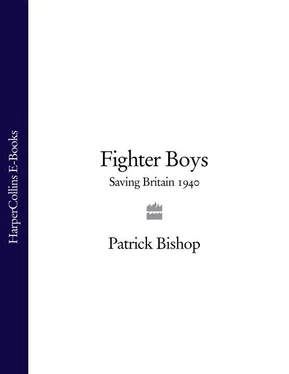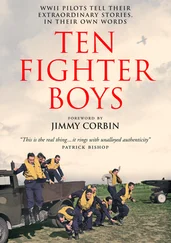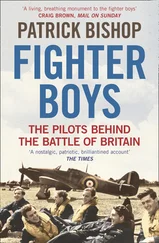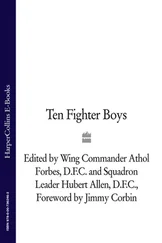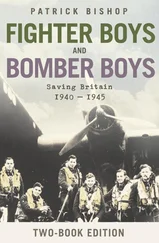Fighter Boys
Saving Britain 1940
Patrick Bishop
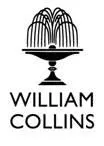
HarperCollins Publishers 77–85 Fulham Palace Road, Hammersmith, London W6 8JB
www.harpercollins.co.uk
First published in Great Britain by
HarperCollins Publishers 2003
Copyright © Patrick Bishop 2003
Portrait © Max Arthur 2004
The Author asserts the moral right to be identified as the author of this work
A catalogue record for this book is available from the British Library
All rights reserved under International and Pan-American Copyright Conventions. By payment of the required fees, you have been granted the non-exclusive, non-transferable right to access and read the text of this e-book on screen. No part of this text may be reproduced, transmitted, downloaded, decompiled, reverse engineered, or stored in or introduced into any information storage and retrieval system, in any form or by any means, whether electronic or mechanical, now known or hereinafter invented, without the express written permission of HarperCollins e-books.
HarperCollins Publishers has made every reasonable effort to ensure that any picture content and written content in this ebook has been included or removed in accordance with the contractual and technological constraints in operation at the time of publication.
Source ISBN: 9780006532040
Ebook Edition © NOVEMBER 2011 ISBN: 9780007381180
Version: 2014–09–11
To Kelly and Bill
Cover Page
Title Page
Copyright
Dedication
Preface
Prologue: The White Hart
1 Sportsmen and Butchers
2 Fighters versus Bombers
3 ‘Free of Boundaries, Free of Gravity, Free of Ties’
4 The Fatal Step
5 Winter of Uncertainty
6 Return to the Western Front
7 The Battle of France
8 Dunkirk
9 Doing It
10 Before the Storm
11 The Channel Battle
12 The Hun
13 Hearth and Home
14 Attrition
15 Brotherhood
16 ‘The Day Had Been a Year’
17 Autumn Sunset
18 Rhubarbs and Circuses
Epilogue: The Last Note
Keep Reading
Notes and References
Index
P.S.
About the author
Portrait
Snapshot
Top Ten Favourite Reads
Life Drawing
About the book
A Critical Eye
The Bigger Picture
Read on
Have You Read?
If You Loved This, You’ll Like…
Find Out More
About the Author
Praise for Fighter Boys
About the Publisher
This book is an attempt to answer a question that has fascinated me since I was a child. I grew up in Kent and London in the late 1950s and early 1960s, when the Second World War was still a real presence. There were daily reminders of it in the weed-choked gaps between houses where German bombs had fallen and the muddy Anderson shelters that could still be found in suburban back gardens.
My first years were spent in the village of Charing. One of my earliest memories is of walking with my father, mother and sister through a ground mist of bluebells in Long Beech woods on the ridge above the village, close to the Pilgrim’s Way. Not long before the skies overhead had been a battleground. Occasionally my playmates and I found cartridge cases rusting underneath the ferns that we imagined had tumbled from the heavens during the fighting. Later I learned that a fighter pilot had crashed in flames into Long Beech after being shot down in the autumn of 1940.
We boys knew all about the Battle of Britain from small, square comic books, describing the great events of the war, that we bought eagerly as soon as they appeared in the village newsagent. They were our first history books. There, for the first time, we met heroes other than our fathers. It was the fighter pilots who hijacked our imaginations. We acted out their deeds in our games and dreamed about being them when we grew up. Their style and dash made them much more glamorous than the earthbound drudges of the infantry. Adults seemed to think so too. The Battle of Britain was mythologised before it was even over and those who took part in it were bathed in the glow of the legend.
At adolescence you shed your old heroes and get a new set. For a while it was slightly embarrassing to recall the passion that the silhouette of a Hurricane or the smudged snapshot of a young pilot once provoked. The grown-ups also seemed to have moved on. This was the Sixties. Men in uniform were now the targets of mockery.
Then, in the funny way that the recent past becomes suddenly almost as remote as the Dark Ages, the pilots slipped into history. There were plenty of books about the battles they fought and their crucial importance to the twentieth century. But they themselves grew obscure, blurred and monochrome like the photographs they took of each other, always smiling, as they hung about at dispersal, waiting to take off.
In the pages that follow I have tried to colour in the picture and to answer the question: What were the Fighter Boys really like? My researches have been helped by the generosity of many people. I am particularly grateful to Malcolm Smith of the Battle of Britain Fighter Association for pointing me to the veterans whose reminiscences enrich this story and answering many queries with his celebrated kindness, good humour and patience. The survivors are men of their time. Everyone I approached was unfailingly courteous, helpful and hospitable. Meetings were invariably a pleasure. The Fighter Boys retain their joie de vivre. The contribution of individuals is made clear in the text, and to each of them I give my thanks. Without them the book could not have been written. I would like to make special acknowledgment to Group Captain Billy Drake, Air Commodore Peter Brothers and Air Chief Marshal Sir Christopher Foxley-Norris for the repeated calls I made on them. Group Captain John Cunningham, Hugh Heron, Squadron Leader Jocelyn Millard, Group Captain Anthony O’Neill, Wing Commander Harbourne Stephen and Flight Lieutenant William Walker were also generous with their time.
I was fortunate to be given access to several unpublished texts. Among them was Tim Vigors’s splendid autobiography, which has yet to appear in print, a situation which I hope will soon be rectified. I am also grateful to the Beaumont family for allowing me to see S. G. Beaumont’s Reminiscences, to the Fenwick family for sending me Charles Fenwick’s account of a young pilot’s life, Dear Mother, and to Michael Butterworth for enabling me to see Group Captain Frank Carey’s personal history. Squadron Leader Dennis Armitage supplemented his talk with me with his written account of the summer of 1940. Edith Kup was kind enough to spend a wintry afternoon filling in some of the gaps in the story of her love affair with Denis Wissler and to allow me to see his letters. Valerie Preston shared with me some of her souvenirs of the White Hart and Robin Appleford has allowed me to reproduce some glimpses of off-duty life in 66 squadron.
I would also like to thank Mrs Lesley Kingcome, her mother Sheila, her daughter Samantha and her son Gavin for their hospitality in Devon and for their memories of the late Brian Kingcome, as well as for permission to quote from his memoir, A Willingness to Die. I am grateful, too, to Sarah Quill for talking to me about her father Jeffery and for showing me letters from the family archive, and to Yvonne Agazarian for sketching in some details of her brother, Noel.
Читать дальше
